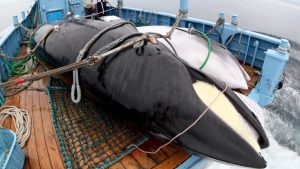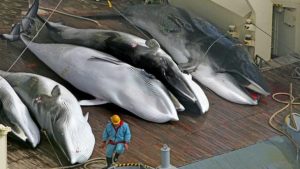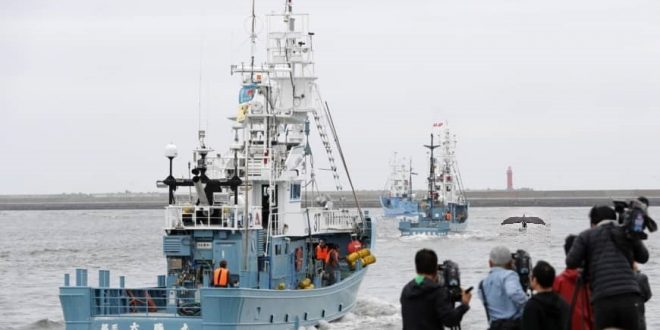TOKYO: Japanese whaling fleets set sail Monday to hunt whales for commercial purposes for the first time in 31 years, a day after Tokyo formally left the International Whaling Commission.
 As an IWC member, Japan halted commercial whaling in 1988 but hunted whales for what it claims were research purposes, a practice criticized internationally as a cover for commercial whaling.
As an IWC member, Japan halted commercial whaling in 1988 but hunted whales for what it claims were research purposes, a practice criticized internationally as a cover for commercial whaling.
In the morning, the Nisshin Maru, a whale factory ship belonging to Kyodo Senpaku Co., and two other whalers left the port of Shimonoseki, Yamaguchi Prefecture, for offshore whaling of the minke, sei and Bryde’s whales.
Five small vessels from six operators also left Kushiro in the northernmost main island of Hokkaido to conduct coastal hunting of minke whales.
 To prevent overhunting, the Fisheries Agency has set a quota of 227 whales for commercial whaling through late December with 52 minke, 150 Bryde’s and 25 sei whales.
To prevent overhunting, the Fisheries Agency has set a quota of 227 whales for commercial whaling through late December with 52 minke, 150 Bryde’s and 25 sei whales.
Fisheries minister Takamori Yoshikawa attended a ceremony to mark the restart of commercial whaling in Shimonoseki.
“From today, I’d like whalers to catch whales by observing the quota and aim for revival of the whaling industry,” Yoshikawa said.
Takashi Takeuchi, 40-year-old captain of a whaling vessel from Taiji, Wakayama Prefecture, told reporters before departing from Kushiro that he “felt uneasy” about the outlook for commercial whaling in Japan, where whale meat consumption is at a fraction of past levels, but hopes “to catch fresh whales and provide them to consumers.”
“Following the restart (of commercial whaling), I hope younger generations will get accustomed to eating whale meat,” Hideki Abe, a 22-year-old crew of a whaling ship from Ishinomaki, Miyagi Prefecture, said in Kushiro.
The IWC was founded in 1948 and Japan joined it in 1951. It was originally composed of whaling nations, but increasing memberships of anti-whaling countries led the IWC to adopt a moratorium on commercial whaling in 1982.
 Japan has long sought to lift the moratorium and finally withdrew from the IWC on Sunday after the organization last September voted down its proposal to resume commercial whaling of species considered abundant such as minke whales.
Japan has long sought to lift the moratorium and finally withdrew from the IWC on Sunday after the organization last September voted down its proposal to resume commercial whaling of species considered abundant such as minke whales.
It was the first time the country had left a major international organization in its postwar history.
Japan says it will hunt whales in nearby waters and within its exclusive economic zone but not in the Antarctic Ocean, where the country had carried out whaling for what it describes as research purposes.
Japan started such whaling in the Antarctic and northwest Pacific oceans in 1987 and in 1994, respectively, although it received international opprobrium.
Although scientific whaling is recognized by the International Convention for the Regulation of Whaling, meat from the captured whales was sold domestically, fueling international condemnation that commercial whaling was being conducted under the guise of science.
Nevertheless, Japan continued its research, gathering data it believed would be useful for determining quotas when it reverted to commercial whaling at a future point.
Annual domestic consumption of whale meat was around 200,000 tons in the 1960s, but the figure has fallen to around 5,000 tons in recent years, according to government data.
The agency said Monday annual whale meat supply from commercial whaling is expected to be lower than that from scientific whaling. (Source: Japan Times)
 Pressmediaofindia
Pressmediaofindia




